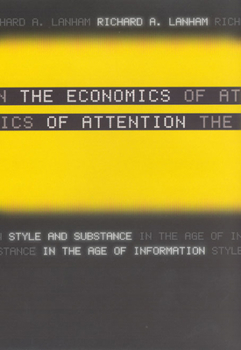The Economics of Attention: Style and Substance in the Age of Information
Select Format
Select Condition 
Book Overview
If economics is about the allocation of resources, then what is the most precious resource in our new information economy? Certainly not information, for we are drowning in it. No, what we are short of is the attention to make sense of that information. With all the verve and erudition that have established his earlier books as classics, Richard A. Lanham here traces our epochal move from an economy of things and objects to an economy of attention...
Format:Hardcover
Language:English
ISBN:0226468828
ISBN13:9780226468822
Release Date:April 2006
Publisher:University of Chicago Press
Length:326 Pages
Weight:1.40 lbs.
Dimensions:1.2" x 6.7" x 9.2"
Customer Reviews
3 ratings
Rhetoric to the rescue in the information age
Published by Thriftbooks.com User , 15 years ago
This is a gem of a book that deserves more credit than these reviews allow. Lanham brilliantly uses a focus on attention to open up economics, rhetoric, art, the internet, universities as institutions, and the style/substance interdependence. He comes across as futuristic in his professor in L.A. way and as a very old school classicist in more of a deep school way. What is rare and very refreshing in this work is his strong faith and understanding of rhetoric, the lively and ancient road less taken by philosophers. His writing is delectable and every paragraph offers something to think about. I would leave a sample quote but instead I'll recommend checking out the sample pages in the Look Inside feature above.
an updated, timely reading of the Internet in contemporary culture
Published by Thriftbooks.com User , 18 years ago
"Seeing clearly what is happening as the word moves from page to screen seems...to depend on seeing clearly what is happening in the world that expressive field has to express," the noted, influential rhetorician Lanham remarks in the beginning of his "Preface." His metaphor of an economy for this "expressive world" is literarily, generally, and perceptively apt. It's more than a useful image. In this economy, "attention is the commodity in short supply." In this economy, individuals "budget" their attention; and web designers, software engineers, computer makers, marketers, and more and more writers are in competition for the attention of consumers, users, and readers; which attention is often leads in one way or another to earnings. Anyone who has used the Internet to find information, buy something, communicate with others, pay bills, and other activities both common and innovative will have a feel for what Lanham proposes and investigates. The terms "cyperspace" and "virtual reality" no longer suffice to relevantly denote the substantive place the digital world with its operations and potentials has taken in most persons' lives. Such terms now seem exotic or frivolous considering, as Lanham recognizes, how the considerably arbitrary, yet essential and formulative trait of attention has ineluctably moved to the computer screen.
The Economics of Attention
Published by Thriftbooks.com User , 18 years ago
Lanham has been a university professor for about 40-years, Yale-educated, English lit and rhetoric. He came of age pre-computer revolution, when writing meant manual type-writers and white-out and transcription. This series of connected essays are his ideas about what the digital revolution means for the future of books, universities and what he calls "the economics of attention" - how the world operates when information is plentiful and the scarce resource are "eyeballs" (attention). We are flooded with high-quality art, news, books, movies, data of every type - it is not an "information economy" because information is as plentiful as air - the scarce resource is peoples attention. In that environment, style (the wrapping paper, the ornamentation, packaging, literary style, etc..) becomes more important than substance - style is the substance (think for example all the crazy cultural things that come out of Japan - all style, no substance). He also discusses how we interact with things: we look "at" them, or we look "through" them - ie. we enjoy them for what they are, or we analyze them. We read a novel/movie on a literary level and dissect how it was created or and historical context, or we "get lost in the book" and enjoy it for what it is. These two forces are in a constant tug of war with every object we own - cars for example, utilitarian or style (or some combo usually). In the end Lanham concludes it is the liberal arts that will save the day for they are the ones who are trained to filter (critics) and create design and style (the new substance). He also provides the most detailed and lucid explanation I've seen on why paper books have not been replaced by the digital medium.






